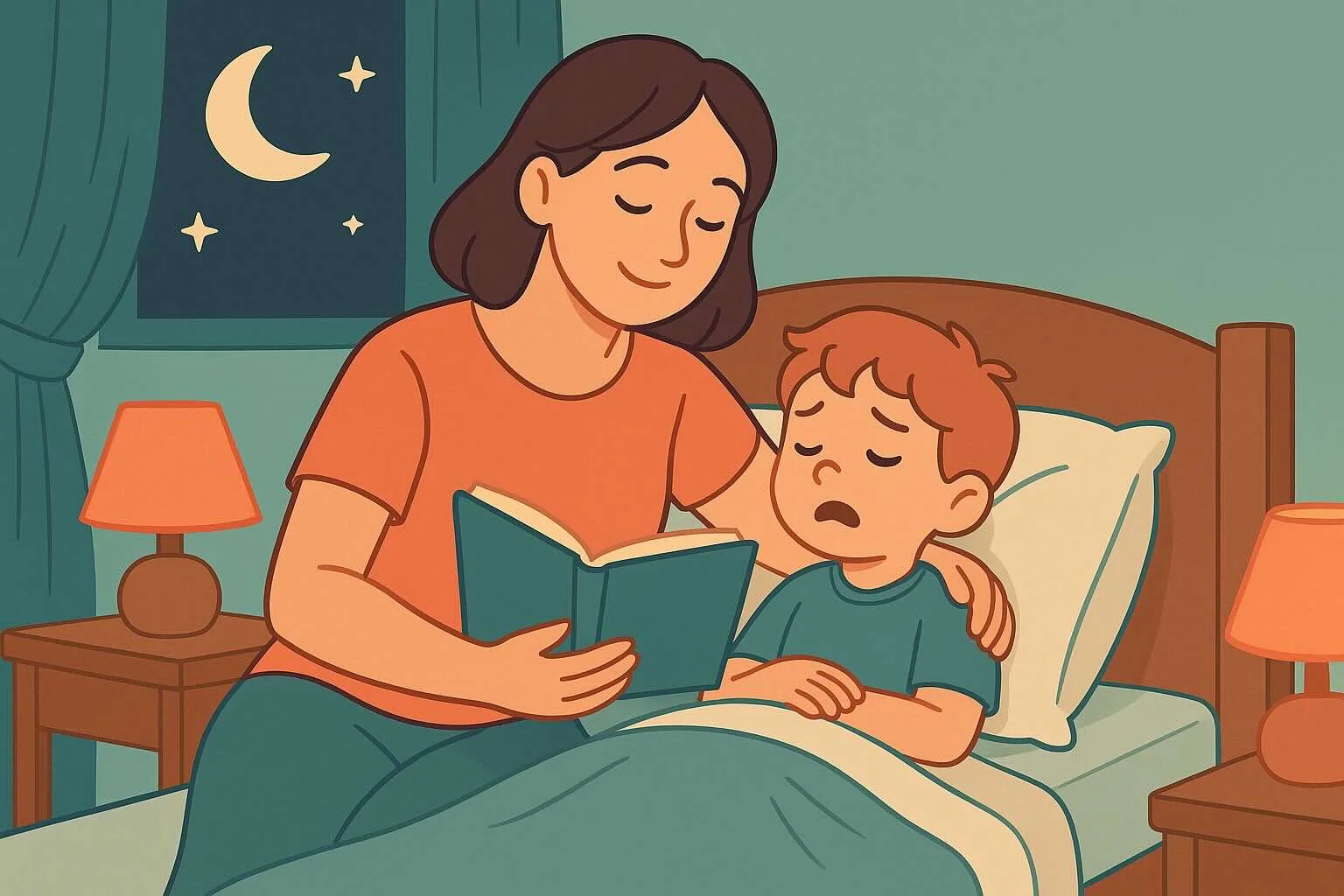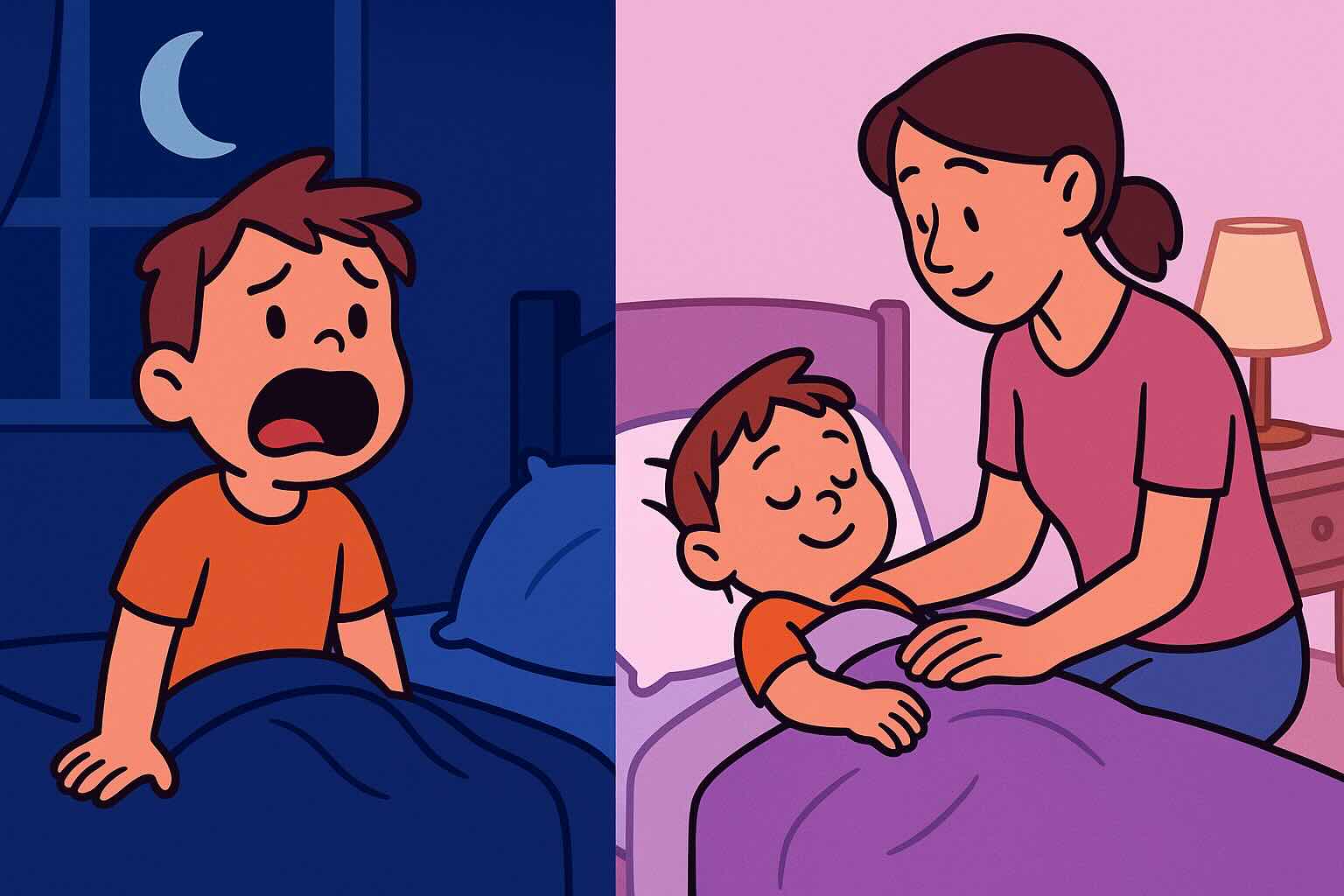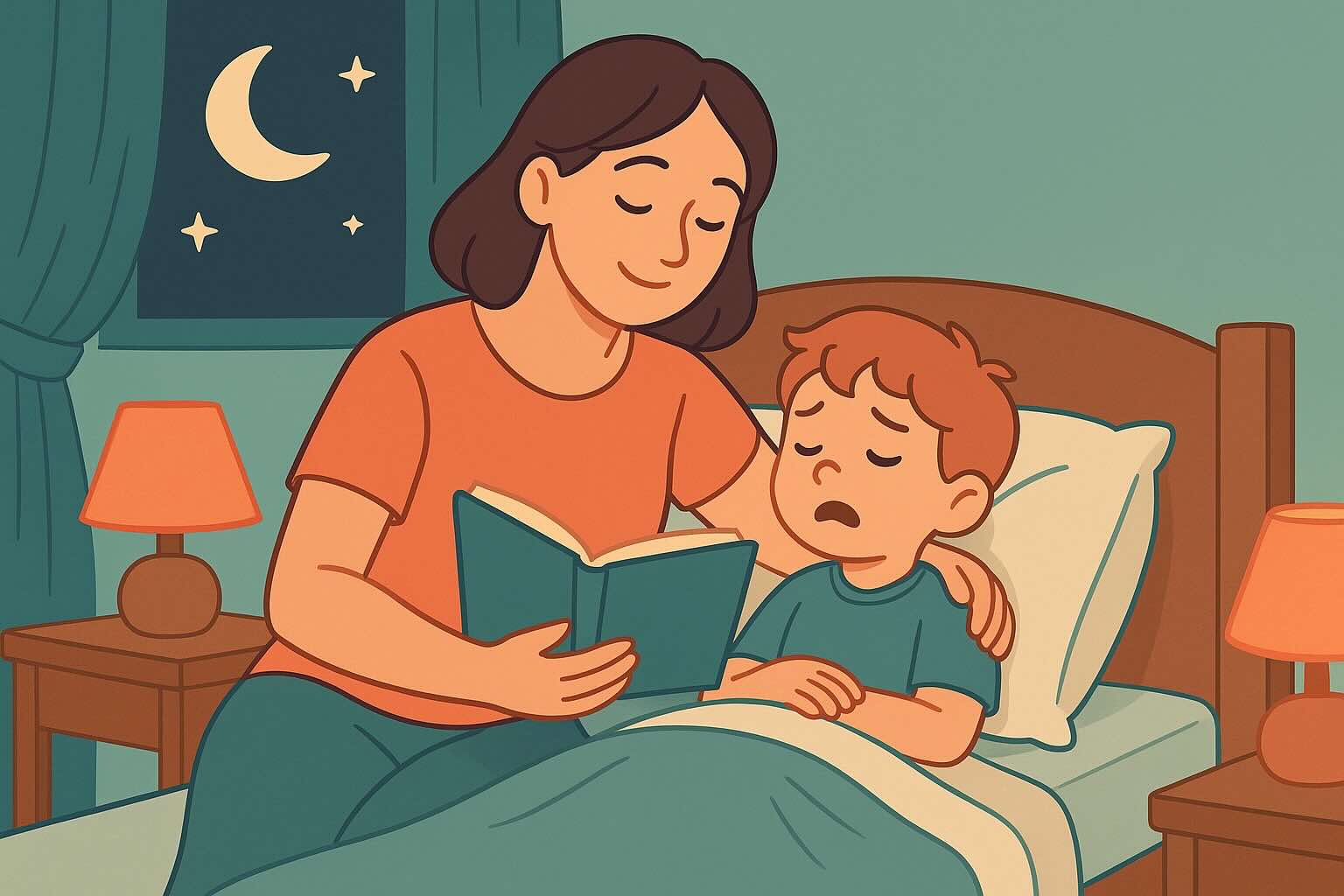6 Year Old Bedtime Routine: Elementary Success Strategies

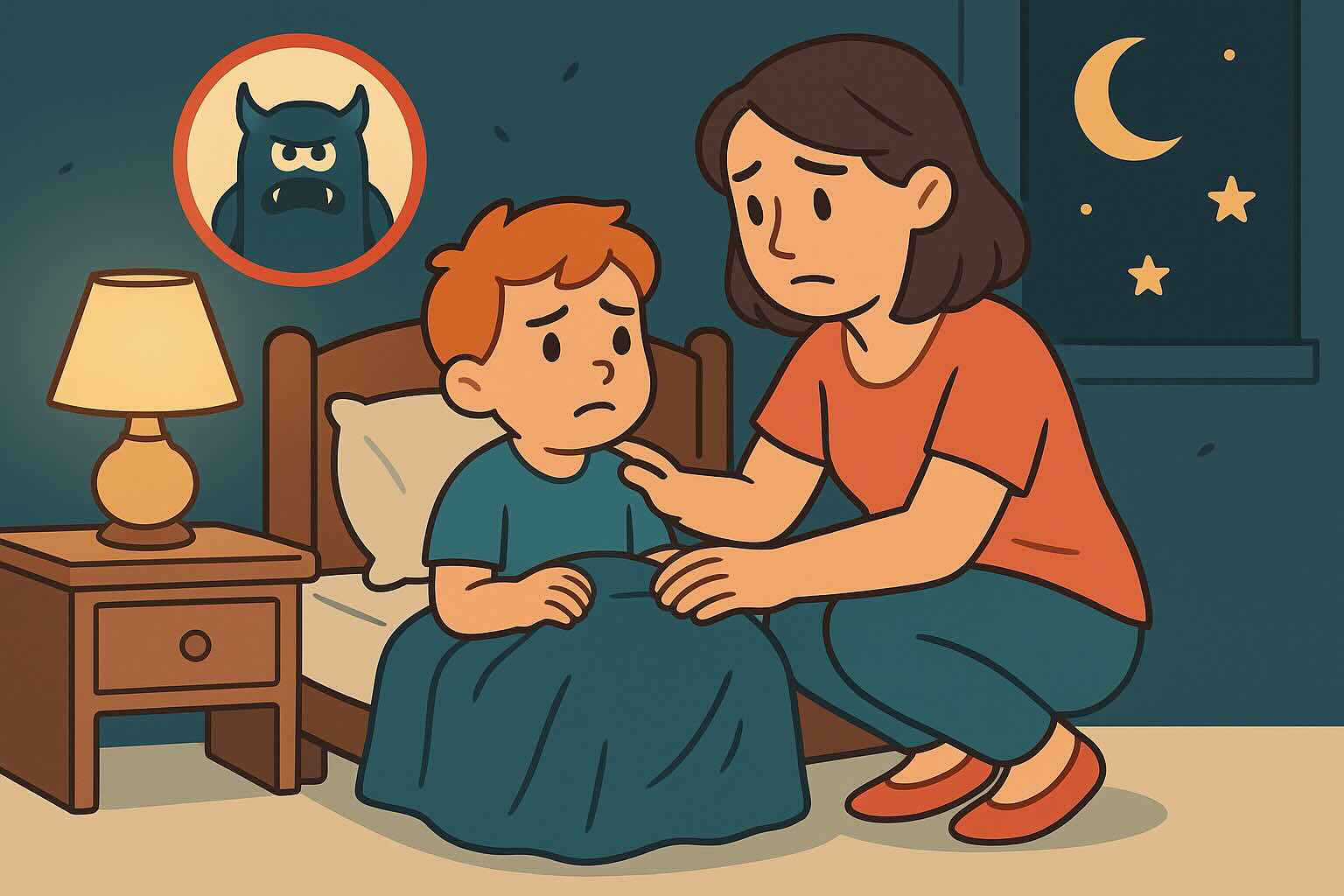
Your 6-year-old is now a full-fledged elementary school student, navigating the exciting but demanding world of first grade with its increased academic expectations, longer school days, and growing social complexity. This transition brings new challenges to bedtime routines as your child balances homework, after-school activities, and the need for adequate sleep.
If you're finding that bedtime has become more complicated with school demands, or if your 6-year-old is pushing for later bedtimes like their older friends, you're experiencing one of the most common challenges of the elementary school years.
Research shows that 87% of parents struggle to balance school demands with healthy sleep routines for 6-year-olds, yet adequate sleep is more crucial than ever for academic success, emotional regulation, and physical development.
The wonderful news is that 6-year-olds are developmentally ready for highly independent bedtime routines that can actually simplify your evenings while ensuring they get the quality sleep they need to thrive in school and beyond.
This comprehensive guide will help you create a bedtime routine that supports your 6-year-old's growing independence, academic success, and overall well-being using our proven 3-step sleep method, specifically adapted for the unique needs of elementary school children.
Understanding Your 6-Year-Old's Sleep and Academic Needs
Sleep Requirements for Elementary Success
Six-year-olds need 9-11 hours of quality sleep per night for optimal cognitive function, memory consolidation, and emotional regulation. For school-age children, this typically translates to:
- Bedtime: 7:30-8:30 PM (depending on wake-up time)
- Wake time: 6:30-7:30 AM (school schedule dependent)
- Total nighttime sleep: 9-11 hours
- Naps: No longer needed; may actually interfere with nighttime sleep
The consistency of sleep timing becomes increasingly important as academic demands intensify.
How Sleep Directly Impacts School Performance
Quality sleep is not a luxury for 6-year-olds—it's a necessity for school success. Well-rested first-graders demonstrate:
Enhanced Learning Capacity: Sleep consolidates new information, transferring it from short-term to long-term memory. Reading skills, math concepts, and classroom lessons are literally "saved" during sleep.
Improved Attention and Focus: Adequate sleep supports sustained attention during longer academic periods, following multi-step directions, and staying engaged during instruction.
Better Emotional Regulation: Rested children handle classroom frustrations, peer conflicts, and academic challenges with greater resilience and emotional stability.
Stronger Executive Function: Sleep supports planning, organization, and self-control—crucial skills for managing homework, following classroom rules, and independence.
Enhanced Physical Coordination: Sleep supports the fine motor skills needed for writing, cutting, and other classroom activities.
Developmental Characteristics of 6-Year-Olds
Understanding your 6-year-old's development helps you create appropriate bedtime expectations:
Increased Independence: They can handle complex self-care routines with minimal supervision while still appreciating connection and support.
Rule-Oriented Thinking: Six-year-olds appreciate clear, consistent rules and take pride in following routines correctly.
Social Awareness: They're highly aware of what peers do and may compare family rules to those of friends.
Academic Identity: They're beginning to see themselves as students and can connect sleep to school performance.
Time Concepts: They understand time more concretely and can work within time limits effectively.
Reading Development: Many are becoming independent readers, which affects bedtime routine dynamics.
The 3-Step Sleep Method for 6-Year-Olds
Our evidence-based approach is particularly effective with 6-year-olds because they can understand complex explanations, take pride in independence, and connect their actions to outcomes.
Step 1: Create Your Story
Your bedtime "story" for a 6-year-old should emphasize their capability while maintaining necessary structure. Include:
The Elementary School Bedtime Sequence:
- Homework and after-school activities completion (not part of bedtime routine)
- Transition warning and current activity wrap-up
- Completely independent hygiene routine
- Independent pajama selection and dressing
- Tomorrow preparation (clothes, backpack, special items)
- Reading time (balanced independent and together reading)
- Brief connection and reflection
- Independent settling with minimal parent involvement
Your Response Plan for 6-Year-Old Scenarios:
- How you'll handle requests to stay up later like friends
- Your approach to bedtime homework anxiety
- How you'll respond to bedtime social drama reports
- Your method for handling Sunday night school stress
- Your plan for maintaining routines during busy school periods
Sample Story for 6-Year-Old: "At 8:00 PM, I'll give a 10-minute warning to finish current activities. At 8:10, they'll go independently to their room and complete their hygiene routine (face, teeth, bathroom) without reminders. They'll choose pajamas and get dressed, then we'll spend 3 minutes preparing for tomorrow by laying out clothes and checking that backpack is ready. Reading time is 15 minutes: they'll read a book to me for 7 minutes, then I'll read to them for 8 minutes. We'll have a brief check-in about the day and tomorrow's plans (3 minutes), then they'll settle independently in bed. If they try to negotiate bedtime, I'll say 'You want more time AND your body needs sleep to be your best student self tomorrow. Sleep well!' If they need me after lights out, I'll provide brief, calm assistance but won't restart the routine."
Step 2: Share Your Story
Six-year-olds appreciate being treated as mature partners in creating family routines and can understand sophisticated explanations.
How to Share with a 6-Year-Old:
"Now that you're a first-grader, we're going to create a bedtime routine that helps you be the best student you can be! I'm going to explain exactly how good sleep helps your brain learn and grow, and how you can take charge of your bedtime routine like the responsible kid you're becoming."
Connect Sleep to Their Goals:
- "Students who get good sleep remember what they learn better"
- "When you're well-rested, you can focus during the teacher's lessons"
- "Good sleep helps you have patience with friends and enjoy school more"
- "Teachers notice when students are alert and ready to learn"
Explain Each Component:
- "You'll handle your entire bedtime routine independently because you're so capable now"
- "We'll prepare for tomorrow so your mornings are calm and successful"
- "Reading together helps you become an even better reader while we stay connected"
- "You'll settle in bed on your own because you're learning to take care of yourself"
Get Their Investment:
- "What would help you remember all the steps in your routine?"
- "How can we make sure you get the best sleep for school success?"
- "What goals do you have for becoming more independent at bedtime?"
Step 3: Follow Through
With 6-year-olds, follow-through should emphasize their growing maturity while maintaining loving boundaries.
Follow-Through Strategies:
For Peer Comparison Arguments:
- Acknowledge their observation: "You've noticed that some friends have different bedtimes"
- Explain family values: "Our family prioritizes sleep because we know how much it helps you succeed"
- Connect to their identity: "You're the kind of student who takes care of their body and brain"
For Academic Stress at Bedtime:
- Validate briefly: "You have some worried feelings about school"
- Redirect to sleep benefits: "Good sleep helps your brain work its best tomorrow"
- Provide reassurance: "You're prepared, and tomorrow you and your teacher will handle whatever comes up"
For Independence Struggles:
- Praise progress: "You're handling so much of your routine independently!"
- Offer minimal support: "You've got this! I'll be nearby if you truly need help"
- Build confidence: "Look how responsible you're becoming!"
Elementary School-Ready Bedtime Routine for 6-Year-Olds
Here's a detailed routine designed to maximize independence while supporting academic success:
8:00 PM - 10-Minute Warning
"In 10 minutes, it will be time for your bedtime routine. Please finish what you're doing and put away your materials."
Six-year-olds can handle shorter transition times and take more responsibility for wrapping up activities.
8:10 PM - Independent Hygiene Routine (8 minutes)
They handle this completely independently:
- Face washing: Thorough face and hands washing
- Teeth brushing: Full 2-minute brushing with possible parent quality check
- Bathroom: Final bathroom visit
- Hair care: Brushing hair if needed
Praise their independence: "You took such good care of yourself without any reminders!"
8:18 PM - Pajamas and Tomorrow Prep (5 minutes)
Independent clothing management:
- Choose and put on pajamas without assistance
- Lay out complete school outfit for tomorrow
- Ensure backpack is packed and ready
- Set out any special items needed for tomorrow (library books, show-and-tell items, sports equipment)
This builds organizational skills crucial for elementary success.
8:23 PM - Reading Time (15 minutes)
Balanced literacy development:
- First 7 minutes: They read a book appropriate for their level to you
- Next 8 minutes: You read a chapter book or story slightly above their level
- Discuss what they read to build comprehension
- Keep books in their room to build independence
8:38 PM - Brief Connection (3 minutes)
Concise but meaningful conversation:
- "What was the best part of your day?"
- "What are you looking forward to tomorrow?"
- Share one thing you're proud of them for
- Express confidence: "You're going to have a great day tomorrow!"
8:41 PM - Independent Bedtime
- They get in bed and arrange their comfort items
- Final hugs and kisses if desired
- Brief goodnight phrase
- They settle independently without parent presence
- Trust their ability to fall asleep on their own
Managing School Demands and Sleep Balance
Homework and Bedtime Boundaries
Critical Rule: Homework is NEVER part of bedtime routine. Complete all homework before dinner or immediately after school.
When Homework Runs Late:
- Maintain bedtime routine timing
- May need to shorten reading time slightly
- Never skip bedtime routine entirely
- Address homework time management the next day
Homework Anxiety at Bedtime:
- "You have worried feelings about homework. Tomorrow after school, we'll make a plan to help you feel more prepared. Right now, sleep helps your brain work its best."
After-School Activity Management
Planning Strategy: Work backwards from bedtime to ensure adequate routine time.
Busy Night Adaptations:
- Prepare everything possible beforehand (clothes laid out, backpack ready)
- Have a "quick routine" version that maintains core elements
- Never eliminate routine entirely—even 15 minutes is better than nothing
Weekend Recovery: Maintain similar bedtime on weekends to avoid Monday morning difficulties.
Managing Social Pressures
"My Friends Stay Up Later": "Different families have different rules. Our family chooses early bedtimes because we know how much sleep helps you be successful and happy. Your friends' families might make different choices, and that's okay for them."
Sleepover Preparation:
- Teach flexibility: "At sleepovers, do your best to get some rest even if everyone else stays up late"
- Practice occasional later bedtimes at home to build tolerance
- Plan recovery after sleepovers
Common 6-Year-Old Bedtime Challenges and Solutions
Challenge 1: "I'm Not Tired!" (When They Clearly Are)
Why It Happens: Six-year-olds may fight their natural fatigue to avoid missing out or to assert independence.
Signs They're Actually Tired:
- Yawning, rubbing eyes, or lying down
- Increased emotional reactions or meltdowns
- Hyperactive behavior (overtiredness)
- Difficulty focusing on simple tasks
Solution: "You don't feel tired right now AND your body shows signs that it needs rest. Even if your brain feels awake, your body needs sleep time to grow strong and help you learn. Your job is to rest quietly in bed."
Challenge 2: Bedtime Procrastination and Stalling
Why It Happens: Six-year-olds have developed sophisticated stalling techniques and may test whether rules still apply.
Common Stalling Tactics:
- Suddenly remembering "very important" things to tell you
- Multiple bathroom trips
- "Just one more" requests for everything
- Dramatic declarations of hunger or thirst
Solution:
- Address genuine needs during the routine
- For additional requests: "That sounds important AND bedtime routine is finished. Let's talk about it tomorrow."
- Use broken record technique: "Time for sleep" said calmly
- Stay boring and consistent
Challenge 3: Academic Performance Anxiety
Why It Happens: First grade brings new academic pressures, and some children worry about performance, tests, or teacher approval.
Bedtime Worry Signs:
- "What if I can't do the math tomorrow?"
- "What if the teacher is disappointed in me?"
- Physical complaints without medical cause
- Resistance to school preparation
Solution: "You have worried feelings about school. It's normal to want to do well. Tomorrow, you and your teacher will work together on whatever comes up. Right now, good sleep helps your brain work its best. You're prepared and capable."
Avoid: Long problem-solving sessions at bedtime—address academic concerns during daytime conversations.
Challenge 4: Social Drama Reports at Bedtime
Why It Happens: Six-year-olds are navigating complex social relationships and may save up social concerns to share at bedtime.
Common Reports:
- Friend conflicts from school
- Feeling left out or excluded
- Playground drama
- Teacher interactions
Solution: "It sounds like you had some challenging social moments today. I want to hear about them, AND bedtime is time for rest. Tomorrow after school, let's talk about what happened and how to handle it."
Follow Through: Actually schedule this conversation the next day to show you take their concerns seriously.
Advanced Independence Strategies for 6-Year-Olds
Self-Monitoring and Responsibility
Personal Bedtime Checklist: Create a checklist they manage independently
- ☐ Brush teeth thoroughly
- ☐ Wash face and hands
- ☐ Put on pajamas
- ☐ Lay out school clothes
- ☐ Pack backpack
- ☐ Set out special items for tomorrow
- ☐ Get in bed
Time Management Skills:
- Teach them to read the clock and manage their routine timing
- Use timers they can set and monitor themselves
- Celebrate efficiency: "You finished your routine with 5 minutes to spare!"
Problem-Solving and Decision-Making
Choice Architecture: Offer meaningful choices within structure
- "Would you like to read your book first or have me read first?"
- "Do you want to prepare tomorrow's clothes before or after hygiene routine?"
- "Which two books would you like in tomorrow's bedtime rotation?"
Independent Problem-Solving:
- "What should you do if you forgot to brush your teeth after getting in bed?"
- "How can you remember to pack your library book for tomorrow?"
- Praise their solutions: "You figured out a great plan!"
Emotional Regulation Skills
Self-Soothing Techniques:
- Deep breathing exercises: "Take five slow, deep breaths"
- Progressive muscle relaxation: "Tense and release each muscle group"
- Visualization: "Imagine your favorite peaceful place"
- Gratitude practice: "Think of three good things from today"
Managing Big Feelings:
- Validate emotions: "You have frustrated feelings about bedtime"
- Teach coping: "When we have big feelings, deep breaths help our bodies calm down"
- Redirect to rest: "Rest time helps our emotions feel more balanced tomorrow"
Creating the Optimal Sleep Environment for Academic Success
Room Organization for Maximum Independence
Accessible Setup:
- All bedtime needs within their reach
- Tomorrow's clothes area clearly designated
- Books organized in easy-to-access basket
- Comfortable reading area with appropriate lighting
School Connection:
- Backpack station near bedroom for easy morning access
- Calendar or visual schedule showing tomorrow's activities
- School achievement displays to reinforce academic identity
Technology Management for Better Sleep
Digital Boundaries:
- All screens off 1 hour before bedtime
- Charging station outside bedroom
- Use analog alarm clocks instead of phones/tablets
Helpful Technology:
- White noise machine if helpful for concentration
- Dim reading light they can control independently
- Sunrise alarm clock for natural wake-up support
Comfort and Security Balance
Age-Appropriate Comfort:
- Stuffed animals or special blankets still okay if comforting
- Room temperature control they can manage (fan, extra blanket)
- Nightlight only if genuinely needed for safety
Independence Support:
- Room layout that supports safe, independent movement
- Emergency procedures clearly understood
- Confidence-building elements in room decor
Sample Scripts for Common 6-Year-Old Scenarios
When They Want to Stay Up Like Friends
Child: "Sarah gets to stay up until 9:30! Why can't I?"
Instead of: Criticizing other families or getting defensive
Try: "Different families make different choices about bedtime. Our family knows that you need good sleep to be the awesome student and person you are. We make decisions based on what's best for you, not what other families do."
When They Report Academic Worries
Child: "I'm worried I won't remember my spelling words for the test tomorrow."
Instead of: Offering to practice right now or dismissing their concern
Try: "You have worried feelings about your spelling test. You studied hard today, and that's what good students do. Tomorrow your brain will remember what you practiced, especially with good sleep tonight. Right now, rest is the best thing for your brain."
When They Want to Read "Just One More Chapter"
Child: "Please can we finish this chapter? I really want to know what happens and it's almost over!"
Instead of: Giving in or abruptly cutting off their enthusiasm
Try: "You're so excited about this story! That shows you're becoming a great reader. We'll find out what happens tomorrow, AND right now your brain needs sleep to remember all the wonderful parts we've already read together."
When They Can't Fall Asleep
Child: "I've been trying to fall asleep for like an hour! I just can't do it!"
Instead of: Getting frustrated or offering solutions that restart the routine
Try: "Sometimes sleep takes a while to come, and that's completely normal. Your job is to rest quietly in bed. You can practice your breathing, think about tomorrow's fun activities, or just rest your body. Sleep will come when your body is ready."
Supporting Morning Success Through Evening Preparation
The Strategic Night-Before Routine
Complete Outfit Selection: Weather-appropriate clothes laid out completely (including socks and underwear)
Backpack Organization: All homework, library books, permission slips, and special items packed and ready
Morning Timeline: Review tomorrow's schedule so they know what to expect
Breakfast Planning: Decide on breakfast choice to eliminate morning decisions
Wake-Up Environment Optimization
Natural Light Support: Blackout curtains with sunrise alarm or automatic curtain opening
Consistent Timing: Same wake time every day, including weekends, to regulate their internal clock
Positive Transition: "Good morning, superstar! You slept well and you're ready for an amazing day at school!"
Building Morning Independence
Self-Directed Morning Routine: Because evening preparation was thorough, mornings can be mostly independent
Time Awareness: Teach them to check the clock and manage their morning timing
Problem-Solving: "What should you do if you can't find your library book?" (Answer: Check your backpack where you put it last night)
Tracking Progress and Optimizing for Success
Key Indicators to Monitor
Sleep Quality Markers:
- Falls asleep within 20 minutes of lights out
- Sleeps through the night without waking
- Wakes up alert and in good mood
- Maintains energy throughout school day
Academic Performance Connections:
- Teacher feedback about attention and participation
- Homework completion quality and speed
- Their own reports of feeling alert during lessons
- Ability to follow multi-step directions
Independence Growth:
- Completes routine steps without reminders
- Problem-solves minor routine hiccups independently
- Takes pride in their growing responsibility
- Handles bedtime transitions calmly
When to Adjust the Routine
Earlier Bedtime Indicators:
- Difficulty waking up in the morning
- Afternoon fatigue or crankiness
- Teacher reports of attention difficulties
- Frequent illness (sleep deprivation affects immune system)
Later Bedtime Possibilities:
- Consistently lies awake for 30+ minutes after lights out
- Wakes up very early and cannot fall back asleep
- Shows no fatigue even after very active days
Routine Modifications:
- Seasonal adjustments for daylight changes
- Temporary modifications during illness or stress
- Adaptations for special circumstances (family events, travel)
Building Toward Lifelong Success
Foundation Skills for Future Academic Demands
The habits your 6-year-old develops now will serve them throughout their educational journey:
Self-Management: Learning to prepare for tomorrow and manage time independently Academic Identity: Connecting their choices (like good sleep) to their success as a student Responsibility: Taking ownership of their health and preparation Resilience: Handling academic and social challenges better when well-rested
Family Sleep Culture Development
Modeling Excellence: Show that the whole family values sleep as a priority Celebrating Success: "You've been sleeping so well and look how great you're doing in school!" Long-term Vision: "These good sleep habits will help you succeed all through school"
Preparing for Growing Independence
Second and Third Grade: The foundation you're building supports increasing homework demands and after-school activities
Social Pressures: Strong sleep habits help them make good choices when peer pressure increases
Academic Challenges: Quality sleep becomes even more important as learning becomes more complex
Related Resources for Continued Success
For additional support with your 6-year-old's development and academic success, explore these related guides:
- 5 Year Old Bedtime Routine Guide - Transitioning from kindergarten to elementary sleep needs
- Starting School Guide - Comprehensive school readiness strategies
- Healthy Sleep Habits Guide - Building lifelong sleep foundations
- Building Cooperation Without Rewards - Intrinsic motivation for bedtime success
- Setting Boundaries Without Punishment - Positive discipline approaches
- Connection Before Correction Guide - Maintaining relationship during independence building
- Childhood Anxiety Complete Guide - Supporting children through academic stress
- Managing Power Struggles - Cooperative approaches to bedtime challenges
Your Investment in Long-Term Success
Creating a strong, independent bedtime routine for your 6-year-old is one of the most valuable investments you can make in their academic success and overall well-being. The skills they're developing—responsibility, time management, self-care, and emotional regulation—will serve them not just in first grade, but throughout their entire educational journey.
Every night that you maintain consistent expectations, you're building their confidence and capability. Every time you trust them to handle their routine independently, you're showing them that you believe in their growing maturity. Every time you connect sleep to their success and well-being, you're helping them understand the importance of taking care of themselves.
Remember that building independence doesn't mean losing connection. The brief but meaningful time you spend together during reading and goodnight rituals remains precious for both of you. You're simply shifting from doing things for them to being present while they do things for themselves.
The 6-year-old who learns to value sleep, manage their routine independently, and connect their choices to their success is developing life skills that extend far beyond bedtime. They're learning to be responsible, organized, and self-directed—qualities that will serve them in academics, relationships, and future endeavors.
Trust in your child's growing capabilities, celebrate their independence, and know that the peaceful bedtime routine you're creating now is giving them tools for a lifetime of success. You're not just helping them sleep better—you're helping them become confident, capable, and well-rested students ready to excel in all aspects of their lives.
24/7 AI Parenting Assistant
Get instant, personalized advice with expert-curated parenting knowledge. Chat with your AI coach anytime, anywhere.
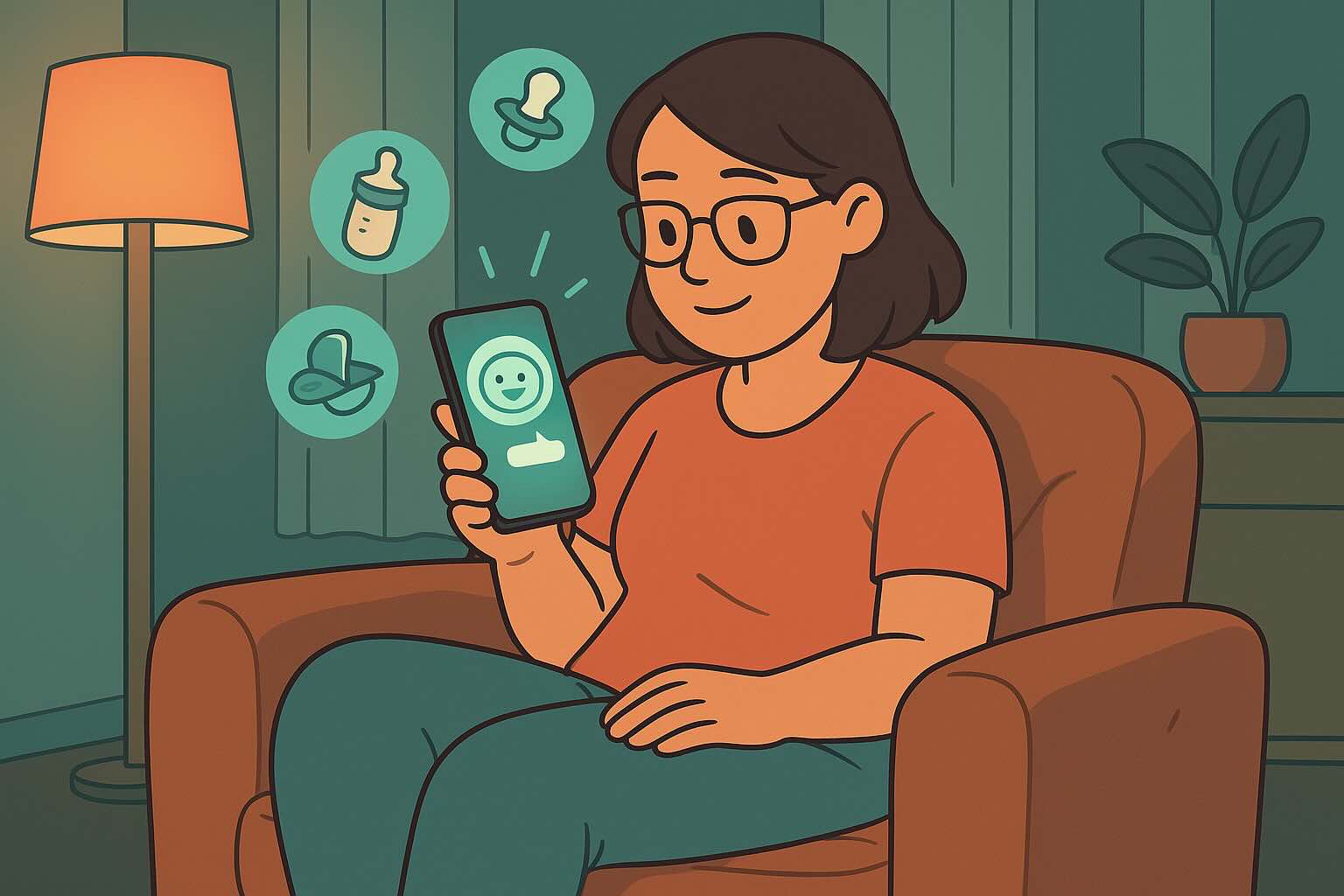
Expert Content Library
Access multimedia resources, articles, and expert-reviewed content organized by topics and your child's age.
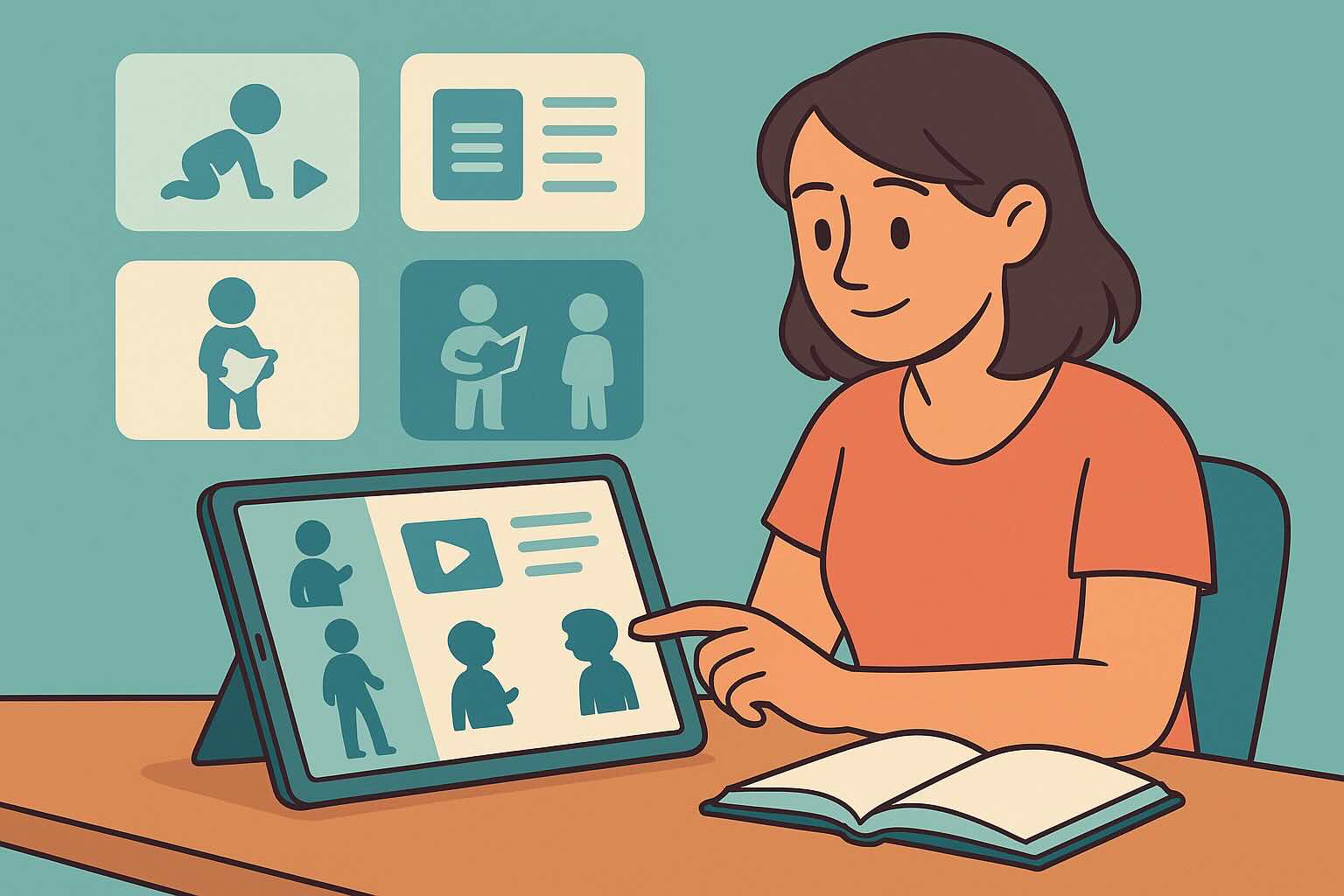
Get Your Free Sleep Training Toolkit
5-day email course + printable sleep log to help your baby sleep through the night
Frequently Asked Questions
Need personalized support?
RootWise's AI coach can provide tailored strategies for your specific situation, available 24/7 when you need it most.
Learn More About AI Coaching →